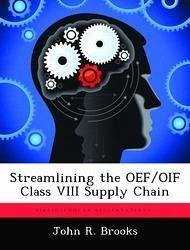This research paper examines the Class VIII (medical) supply chain for U.S. Central Command (CENTCOM). While overarching medical logistics matters like blood management, optical fabrication, and medical maintenance are observed, the thrust of this research aims toward medical resupply only. Specifically, this paper asks the question: how can CENTCOM's Class VIII supply chain be streamlined to reduce logistics footprint and increase overall efficiency? The United States is in the "war on terror" for the long-haul. The U.S. Army cannot afford to maintain organizations and structures that are not absolutely needed and value-added. We are clearly in sustainment and redundant operations cannot be allowed to continue. The primary sources of data for this paper are U.S. Army organizations and personnel serving within (or previously) CENTCOM. Specifically, I am indebted to Army Major David R. Gibson who is currently deployed to Iraq with the 226 Medical Logistics Battalion and Army Colonel (retired) Jonathan M. Kissane for providing me their insight into this topic. Air Force and Joint Doctrine played a large role in formulating my thoughts and academic supply chain analysis tools proved valuable in framing evaluation concepts. Finally, my personal observations working within the medical supply chain along with trips to Kuwait, Iraq, and Qatar in 2004 and 2005 provided a first-person experiential base for further research. During this research, key issues were analyzed which led to conclusions and recommendations.
Hinweis: Dieser Artikel kann nur an eine deutsche Lieferadresse ausgeliefert werden.
Hinweis: Dieser Artikel kann nur an eine deutsche Lieferadresse ausgeliefert werden.








